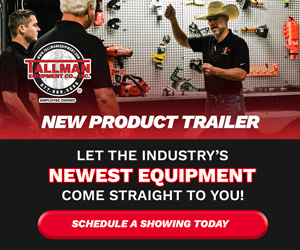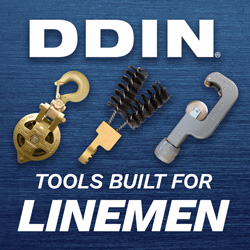Being a Great Dad, Husband, and Lineman is all about “Be Where Your Feet Are.”
If you’re a lineman – or in the trades – and a father working hard to provide for your family, David Mendonca wants you to know you’re not alone. And if you’re struggling to be the best person you can be, he believes you should give his podcast The Show Up Dad a listen.
David spent 14 years as a lineman before starting The Show Up Dad, during a difficult period in his life. But before all of that, he was a Navy combat medic and then a college graduate in computer networking, which seemed the sensible thing to do at the time. For David, though, who grew up on a ranch outside of Santa Fe, New Mexico, a corporate life stuck in a cubicle turned out to be soul-sucking.
Then one day, David was waiting to meet his brother when he pulled up in a four-wheel bucket truck wearing line gear and boots. Impressed, David remembers thinking, “Who the heck is this guy? What the heck is this?” It turns out being a lineman wasn’t just in his family. It was also in his future.
Fast forward to today. David is a successful podcaster and speaker helping blue-collar guys be better fathers, husbands, and crew members. Soon, you’ll also find him helping train the next generation of linemen as an instructor at California-Nevada JATC.
We recently spoke with David about The Show Up Dad and its mission. The following interview has been edited for clarity.
What kind of advice would you give younger guys looking to become a lineman or enter the trades?
It’s not about the money. I know a lot of guys nowadays see the money that we’re making, and they automatically think that this is something for them. Not everybody can be a lineman. So, if you get into this trade, make sure it’s something that you love because there are going to be a lot of sacrifices. If you’re out there half-assing it, you’re going to get yourself hurt, or someone else hurt. That crew is your family. That would be my advice. Make sure it’s something you truly, truly want to do.
You were a successful lineman running a crew. Why did you decide to start your podcast “The Show Up Dad”?
In 2018, my wife came down with a chronic illness. It was Christmas Day. She’d just made dinner and was like, “I’m not feeling good. I’m going to go take a shower.” She went to the back room, then came out in a panic. I could see it in her eyes. “Something’s wrong. I have to go to the emergency room.” This was during H1N1, so I couldn’t bring the kids to the hospital. She went, and I stayed home with them. At two in the morning, I got a call from the nurse, saying her heart had stopped.
Everything in my world just stopped. I started having these thoughts. “What am I going to do? How am I going to raise these kids? What’s happening?” She’s a young 34-year-old woman at the peak of her health and getting ready for a marathon.
So obviously, I couldn’t go back to work. We didn’t know what was going on with my wife. So that started my process of being home. During that time, I started seeing how much I had missed with my children. Soon though, they were literally ready for me to leave. They were uncomfortable with me being home that long because I was always on the road, and they weren’t used to it.
I started seeing that I didn’t have a relationship with my daughter. So I started falling back to an old pattern like how I was raised. Militant and structured. A “tell me” dad vs. “show me” dad. “You need to do this, this, this.”
Being a husband and father was new territory for me. I only had to do it on the weekends or whenever I came home. It did not fly with my family. My wife was out of the hospital and extremely sick, and the kids were in disarray.
Here I was thinking I was doing everything for my family. That’s when I really started putting in the work and doing some self-reflection, looking in the mirror, and being honest with myself: “Man, I’ve been a bad dad. I’ve been a bad husband.” Let me tell you, that hurts. So that sparked this whole movement that’s caught on.
Speaking of this growing movement, it started with your podcast “The Show Up Dad.” What’s it about?
Through my experience, my story, I discovered that providing for our children is important, but when men truly understand that we have a bigger, unique role and gain the knowledge and skills to be great fathers, they can transform and impact future generations. That’s what this whole podcast is about, bringing that awareness that fathers and husbands are more than just a paycheck.
We think that we just have to provide. A lot of times, we’re away from the family on the road and think we can just placate the situation by throwing money at our families. You start treating them like an object. When we do that, we lose that relationship. That’s the most important thing that a father can have with his children is that relationship.
On Show Up Dad, we recognize and understand that you got to provide and sometimes be on the road. But what we’re trying to say is, “Hey, man, make your time count.” There’s a saying in the line trade. “Be where your feet are.” Well, it’s the same thing with fatherhood. When you’re at home, be 100% home. Put down that phone. Be intentional.
“The Show Up Dad” delves into some topics that can be painful and seem to apply to most men.
A lot of the time, as men, we don’t want to talk to anybody. We stuff our emotions. But when you get us together in a group setting, and we’re all like-minded, you’re going to talk. Veterans are like that. They feel out of place because they have no one to relate to what they’ve gone through. It’s the same thing with men. If you get a bunch of guys who are going through the same thing, then they’re like, “Hey, I’m not that much different. I’m actually okay.”
So that’s what I wanted to do. I wanted to create an atmosphere for guys to get together and talk about what was going on. I started talking with other linemen, other friends, mentors, and it just started from there. Then all of a sudden, in January 2020, I said, “Okay, I’m going to try a podcast.” My first podcast was on a laptop on my bed with one foot on the door, hoping to God that my kids wouldn’t run in yelling and screaming!
Since then, you’ve had many diverse and fascinating guests, from journeyman linemen to a Navy Seal, a hostage and crisis negotiator, a mental health counselor, a clinical psychologist, a Green Beret, and the list goes on.
I don’t believe in life hacks. I don’t do that. I believe, and this is a quote from my old man, “You learn from other people’s mistakes.” So all our guests on Show Up Dad are guys who have gone through it. We’re not perfect at all. We just want to help people understand, “Hey, don’t do that. Man, I did that, and this is what it got me.” If you are in a position where you can accept that, then you can learn from us.
The podcast is centered around blue-collar workers. So we cover a lot of the stuff that plagues us as men, like stress. One of the guests we brought on was cognitive therapist Adria Sullivan, who talked about ways to reduce stress and how energy drinks, which I’m guilty of, screw up our sleep. If you’re not sleeping, she explained, you’re literally dying.
I had a well-known strength conditioning coach as a guest on another podcast. He started talking about how we can be better in our positioning as a lineman. A lot of linemen, including me, have pain in our knees, shoulders, elbows because we’re working in these awkward positions. He said if your knee is hurting, look above or below because that’s probably where the cause is. Wherever the pain is, it is usually not the problem. If your lower back hurts, it’s probably your hamstrings or something pulled in your upper back. It’s not necessarily where the pain is. That’s all great information that blue-collar dads need to hear.
A lot of us in the trades are gun advocates. So, we have a podcast coming up about gun safety. I believe in the second amendment, I grew up hunting, but a lot of times right now, kids are getting ahold of guns and taking them to school. Teaching them the reality of the damage a gun can do might change their behavior.
What advice would you give linemen or guys in the trades who are young fathers or about to become fathers?
There’s no such thing as being a perfect dad. We’re all going to make mistakes. We’re going to lose our tempers. But just remember, don’t be so hard on yourself. Just get it right. Adapt and overcome. Be intentional.
You’ve also started a foundation to carry your message forward beyond your podcast. Can you tell us a little about that?
We started The Show Up Dad Foundation on the saying in Malachi 4:6, “He will turn the hearts of the parents to their children, and the hearts of the children to their parents.” We believe it’s that first step as a father of reaching out to your children that starts the change that’s needed. Then, in turn, a child’s heart will turn back to you.
I think there’s a great disconnect for people right now from God, the father. It’s the same thing with our children. Life gets busy, man. You’ve got bills to pay—a crew you need to take care of. But we have to turn our hearts back to our children and make that connection.
Part of our outreach is I speak at events to bring awareness to father engagement and offer resources to help dads. On our website, you’ll find free tools and programs with support from the National Father Initiative, like this amazing program called “Fathering in 15.” It helps men tackle 15 issues they face these days, whether financial, spiritual, or family. Each topic only takes 15 minutes, and you can access it anywhere you have a computer.
Well, David, this has been enlightening. Anything you would like to add?
Just that what we’re doing on the podcast and in the foundation is to help fathers gain insight into why they are acting a certain way. A lot of fathers don’t even know what’s plaguing them. Often, it has to do with your family of origin and how you were taught. Once you have that awareness at the forefront of your forebrain, you can start making changes. It’s our mission to help them get there.
Oh, and I’d like to thank our sponsors at Tallman, Line-1-1 Clothing Company, and Monzingo Knives. Without their support and the support of our audience, this wouldn’t be possible.







0 Comments